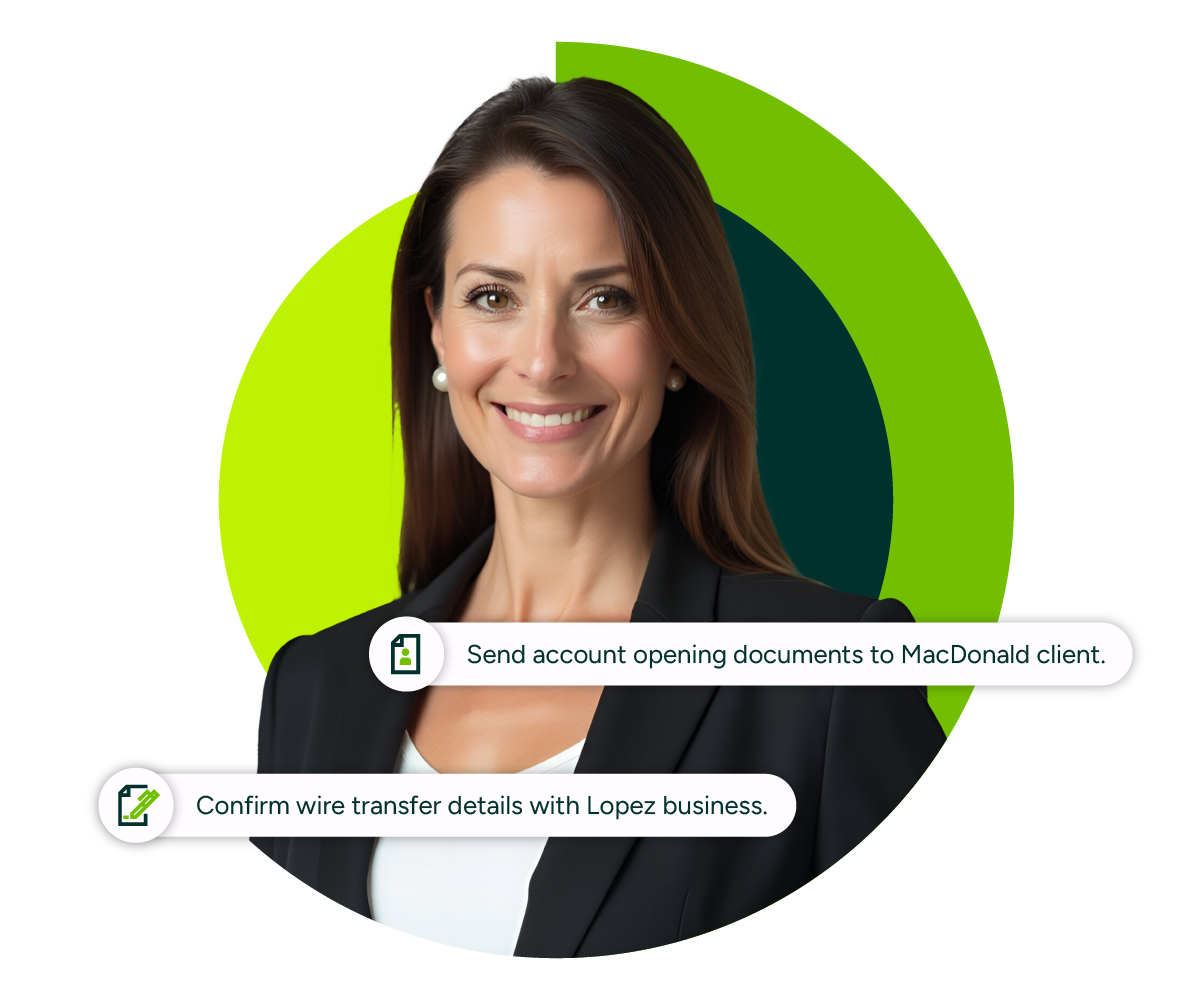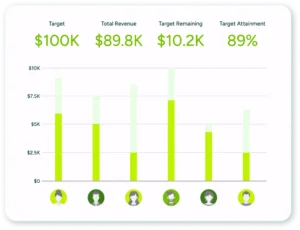
Trusted by 120,000 teams worldwide



The role of CRM in the banking industry
Strengthening customer relationships and retention
Customer relationships are the foundation of success in the banking industry. A well-implemented CRM helps financial institutions maintain personalized engagement, track customer preferences, and provide timely service. By leveraging insights from customer interactions, banks can enhance satisfaction and build long-term loyalty.
Improving financial services with workflow automation
A banking CRM reduces administrative workload by facilitating customer interactions, follow-ups, and document management. From managing client onboarding to tracking loan application milestones, Maximizer helps financial professionals stay organized and responsive without replacing core banking systems.
Ensuring compliance and secure data management
The banking sector operates under strict regulatory requirements. A banking CRM supports compliance efforts by securely managing customer records, tracking engagement history, and maintaining audit logs. Advanced security controls help ensure sensitive financial data is stored and accessed responsibly.
Key features of a banking CRM
Centralized customer data and account management
A banking CRM provides a 360-degree view of customer interactions, consolidating all relevant data into one accessible platform. This helps banking professionals deliver a more personalized and informed customer experience.
AI-powered insights for personalized banking
AI-driven analytics in CRM systems for banking institutions can track customer activity and engagement history. This way, Maximizer enables financial professionals to identify opportunities for proactive service, enhancing relationships and increasing retention.
Automated workflows for client management
From customer onboarding to ongoing account management, banking CRM helps financial teams stay on top of key client interactions with automated follow-ups and task tracking—reducing manual effort and ensuring timely engagement.
Integrated communication and relationship tracking
Communication tracking allows bankers to log calls, emails, and in-person meetings within the CRM. Relationship managers can access conversation history, ensuring continuity in customer interactions.
Data security and compliance
Maximizer offers advanced security settings and customizable user permissions, ensuring financial institutions can control data access while maintaining necessary compliance standards.
Benefits of CRM in the banking sector
Improved customer satisfaction and loyalty
By maintaining comprehensive customer profiles and engagement history, Maximizer helps financial institutions deliver personalized service, strengthening relationships and increasing loyalty.
Increased efficiency and reduced operational costs
Automation tools help financial professionals reduce time spent on manual data entry, freeing them to focus on high-value client interactions.
Enhanced fraud detection and risk mitigation
CRM software for banking industry institutions provides real-time insights and helps monitor customer behavior to detect potential fraud early. AI-driven analytics help to highlight potential risks and comply with industry regulations.
Data-driven decision-making for business growth
CRM systems collect and analyze customer data, offering valuable insights into banking trends, customer behavior, and market opportunities. This enables banks to make informed business decisions, improve service offerings, and identify new revenue streams.
Better collaboration and inter-departmental efficiency
With a centralized CRM system, different departments—such as customer service, risk management, and marketing—can access relevant customer data. This leads to improved internal communication, better cross-functional teamwork, and a more streamlined approach to customer management.
Book a demo and transform your banking CRM strategy
Discover how Maximizer CRM can elevate your banking operations. Schedule a demo today and take the first step toward improved customer relationships and operational efficiency.
Commercial banking CRM vs. retail banking CRM
Relationship management for business clients
For commercial banking professionals, Maximizer helps track key interactions with corporate clients, manage account history, and ensure proactive engagement. By consolidating communication and transactional data, banks can better understand client needs and offer timely financial solutions. Additionally, Maximizer enables commercial bankers to track credit applications, manage business lending processes, and oversee corporate account relationships more efficiently.
Wealth and personal banking solutions
Retail banking teams can leverage Maximizer to track individual customer journeys, anticipate financial needs, and deliver targeted product offerings based on client history. The CRM supports personal bankers in managing loan applications, savings accounts, and financial planning services, ensuring personalized recommendations based on a customer’s financial profile. Maximizer’s engagement tracking tools also help institutions maintain meaningful customer interactions and offer proactive financial guidance.
Relationship management for business clients
For commercial banking professionals, Maximizer helps track key interactions with corporate clients, manage account history, and ensure proactive engagement.
Wealth and personal banking solutions
Retail banking teams can leverage Maximizer to track individual customer journeys, anticipate financial needs, and deliver targeted product offerings based on client history.
How to implement CRM in banking operations
Step 1: Define your customer relationship goals
Identify key objectives, such as improving customer service, enhancing engagement, or increasing cross-sell opportunities. Assess your bank’s challenges and how a CRM can solve them. Outline KPIs that will measure the CRM’s success.
Step 2: Integrate CRM with core banking systems
A banking CRM should complement, not replace, existing banking software. Maximizer’s flexible integration capabilities help ensure smooth data flow between systems.
Step 3: Train employees on CRM best practices
Ensuring CRM success requires employee training. Maximizer offers an intuitive interface that helps banking professionals quickly adopt and utilize its full potential.
Step 4: Customize CRM workflows and automate key processes
Configure Maximizer to match the institution’s needs, from tracking client touchpoints to automating engagement reminders and compliance documentation.
Step 5: Monitor performance and optimize strategies
Regularly analyze CRM data to identify trends, improve customer engagement, and enhance banking operations. Use analytics dashboards to track customer satisfaction, revenue growth, and operational efficiency.
Step 6: Continuously evolve and upgrade
Technology and customer expectations evolve, so your CRM should adapt as well. Regularly update CRM features, integrate AI-driven analytics, and explore new automation tools to maintain a competitive edge.
Why choose Maximizer CRM for banking?
Industry-specific features tailored for financial institutions
Maximizer offers flexible configurations that allow financial institutions to tailor the CRM to their relationship management and operational needs.
Scalable and secure cloud-based solutions
With enterprise-grade security and cloud-based accessibility, Maximizer ensures financial professionals can access critical client information while maintaining data security.
AI-driven customer insights and predictive analytics
With advanced AI analytics, Maximizer helps banks personalize customer interactions, predict financial needs, and optimize service offerings.
Proven track record in financial relationship management
With decades of experience helping businesses manage customer relationships, Maximizer is a trusted solution for financial professionals seeking to enhance client engagement and operational efficiency.
Companies choose to partner with Maximizer
Learn why people love Maximizer
What the Best Financial Professionals Do Daily
Success in financial services isn’t just about assets under management (AUM), annual bonuses, or the number of policies sold. It's about what you do daily. In this business, momentum is built in the...
Financial Advisor Succession Planning Simplified with CRM
For many financial advisors, succession planning is a task that often gets pushed to next quarter—until it becomes an urgent necessity. Whether you’re preparing for retirement, expanding your...
Sales Collaboration: Aligning Teams for Success
Why is sales collaboration important? The Impact on Revenue Growth Sales collaboration directly impacts revenue growth by ensuring teams work toward shared goals. When sales, marketing, and customer...
Try the AI CRM designed for high-performing teams
Experience the future of customer relationship management with Maximizer. Sign up for a free trial today and see how an AI CRM can empower your team to achieve more.
Frequently asked questions
What is a banking CRM?
A banking CRM is a customer relationship management system designed specifically for financial institutions to manage client interactions, track engagement history, and optimize relationship-building efforts.
How does CRM help in the banking industry?
CRM in the banking industry helps improve customer engagement, automate workflows, ensure regulatory compliance, and provide valuable data insights for business growth.
What are the key features of the best banking CRM software?
The best banking CRM software includes centralized data management, AI-driven insights, automated workflows, compliance tools, and integrated communication tracking.
How do banking CRM systems enhance customer relationships?
Banking CRM systems personalize customer interactions, track engagement history, and provide tailored financial recommendations to improve retention and satisfaction.
Why should banks choose Maximizer CRM?
Maximizer CRM offers industry-specific banking features, AI-driven insights, secure cloud-based solutions, and seamless integrations, making it a top choice for financial institutions.
Question?
answer.



